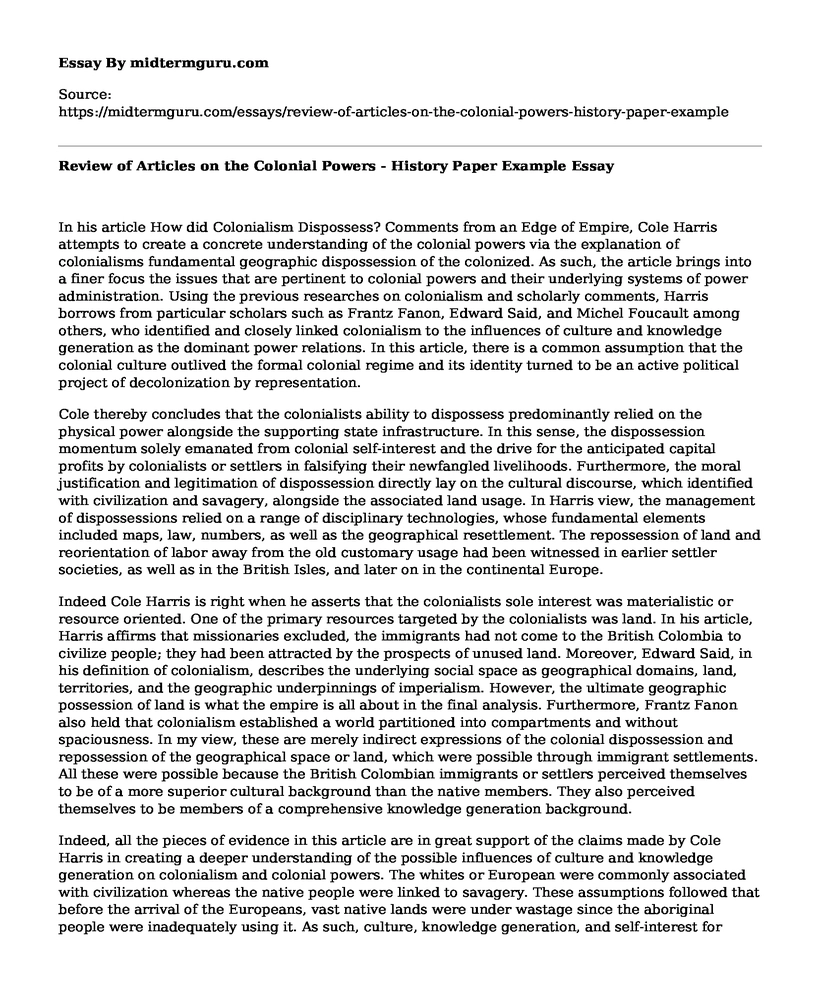In his article How did Colonialism Dispossess? Comments from an Edge of Empire, Cole Harris attempts to create a concrete understanding of the colonial powers via the explanation of colonialisms fundamental geographic dispossession of the colonized. As such, the article brings into a finer focus the issues that are pertinent to colonial powers and their underlying systems of power administration. Using the previous researches on colonialism and scholarly comments, Harris borrows from particular scholars such as Frantz Fanon, Edward Said, and Michel Foucault among others, who identified and closely linked colonialism to the influences of culture and knowledge generation as the dominant power relations. In this article, there is a common assumption that the colonial culture outlived the formal colonial regime and its identity turned to be an active political project of decolonization by representation.
Cole thereby concludes that the colonialists ability to dispossess predominantly relied on the physical power alongside the supporting state infrastructure. In this sense, the dispossession momentum solely emanated from colonial self-interest and the drive for the anticipated capital profits by colonialists or settlers in falsifying their newfangled livelihoods. Furthermore, the moral justification and legitimation of dispossession directly lay on the cultural discourse, which identified with civilization and savagery, alongside the associated land usage. In Harris view, the management of dispossessions relied on a range of disciplinary technologies, whose fundamental elements included maps, law, numbers, as well as the geographical resettlement. The repossession of land and reorientation of labor away from the old customary usage had been witnessed in earlier settler societies, as well as in the British Isles, and later on in the continental Europe.
Indeed Cole Harris is right when he asserts that the colonialists sole interest was materialistic or resource oriented. One of the primary resources targeted by the colonialists was land. In his article, Harris affirms that missionaries excluded, the immigrants had not come to the British Colombia to civilize people; they had been attracted by the prospects of unused land. Moreover, Edward Said, in his definition of colonialism, describes the underlying social space as geographical domains, land, territories, and the geographic underpinnings of imperialism. However, the ultimate geographic possession of land is what the empire is all about in the final analysis. Furthermore, Frantz Fanon also held that colonialism established a world partitioned into compartments and without spaciousness. In my view, these are merely indirect expressions of the colonial dispossession and repossession of the geographical space or land, which were possible through immigrant settlements. All these were possible because the British Colombian immigrants or settlers perceived themselves to be of a more superior cultural background than the native members. They also perceived themselves to be members of a comprehensive knowledge generation background.
Indeed, all the pieces of evidence in this article are in great support of the claims made by Cole Harris in creating a deeper understanding of the possible influences of culture and knowledge generation on colonialism and colonial powers. The whites or European were commonly associated with civilization whereas the native people were linked to savagery. These assumptions followed that before the arrival of the Europeans, vast native lands were under wastage since the aboriginal people were inadequately using it. As such, culture, knowledge generation, and self-interest for natural resources were the core engines that drove the spirits of colonialism.
Bibliography
Fanon, Frantz. The wretched of the earth: Pref. by Jean-Paul Sartre. Transl. by Constance Farrington. Grove Press, 1963.
Harris, Cole. "How did colonialism dispossess? Comments from an edge of empire." Annals of the Association of American Geographers 94, no. 1 (2004): 165-182.
Said, Edward. "Culture and Imperialism. 1993." New York: Vintage (1994).
Cite this page
Review of Articles on the Colonial Powers - History Paper Example. (2021, Jun 02). Retrieved from https://midtermguru.com/essays/review-of-articles-on-the-colonial-powers-history-paper-example
If you are the original author of this essay and no longer wish to have it published on the midtermguru.com website, please click below to request its removal:
- Essay on the Mistakes Russia Made During WW1 and Their Effects on Russia
- Research Paper on Life of St Antony
- Synthesis Paper on Public Administration
- History of Abraham Louis Breguet - Research Paper
- Compare and Contrast Essay on WW2 Countries
- The Argument for the Book of Romans - Essay Sample
- Teddy Roosevelt: America's Youngest and Most Impactful Leader - Essay Sample







